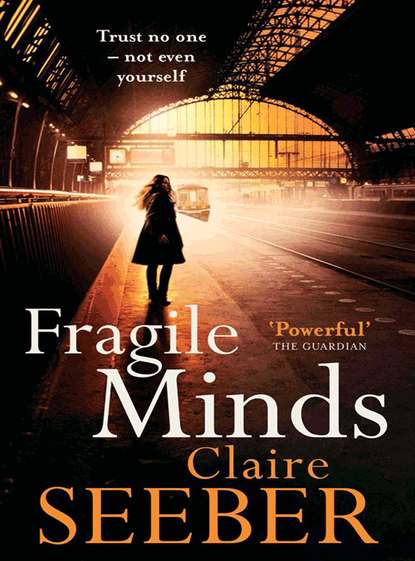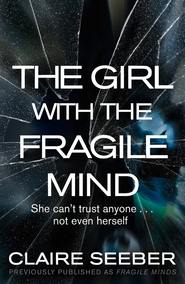По всем вопросам обращайтесь на: info@litportal.ru
(©) 2003-2025.
✖
Fragile Minds
Автор
Год написания книги
2018
Настройки чтения
Размер шрифта
Высота строк
Поля
‘No worries,’ I said, but I was nervous now.
He took a fresh needle and jabbed again – and the same searing pain shot through me.
‘Ow!’
He stared down at me, needle in hand, and I gazed back at him with apprehension. ‘Why’s that happening?’ I asked anxiously, looking at the spot of blood welling from my wrist.
‘I’m not sure. It could be hitting a chi path, ’specially if you’re feeling unwell.’ He stroked his beard again until it began to look pointed. ‘Something feels off kilter to me.’
My vague headache was taking a more severe hold and suddenly I felt violently ill. He was an alien presence, smelling so sickly of patchouli and lavender; and the stupid whale music he’d put on in the background seemed unbearable now.
‘Can you take them out?’ Panic was building in my chest. I was going back to a place I never wanted to revisit. ‘The needles. I really would like you to—’
‘Of course, Claudia. Be still for a moment.’ He removed the first two needles as I tried desperately to calm my breathing.
‘I’m so sorry,’ Francis shook his head, melancholy now. ‘This so rarely happens. And it is inexcusable if it is my fault. But as I say,’ he held his hands above my head now, not touching me, just hovering over my hair, ‘as I say, if you are poorly, then your paths can get so blocked that it causes pain. And I do feel a blockage.’
‘Right.’ I stood now, wishing his hands far away from me. ‘I need to go out now. Thank you for coming.’ I walked to the front door; held it open. ‘It was very kind.’
‘Something is not right, Claudia.’ He stepped through the door, gazing at me. ‘I sense it in your system. Is there anything you’ve changed? Your diet maybe, or—’
‘No,’ I almost shouted. ‘Nothing. Really.’
‘And I did want to talk about Tessa with you. To celebrate her spirit—’
‘Another time, OK?’ I shut the door firmly and leant against it, my heart thumping painfully.
What was happening to me?
Tessa had fitted no mould. Unconventional; gentle but outspoken, it was as if she had been born in the wrong era, out of her time. Push her back through the decades by forty years, and it would have seemed right. She revelled in beauty; the whiteness and the thread count of a tablecloth; the cylindrical shape of a water glass; Grace Kelly’s frocks. She dressed simply, in silks and cottons more expensive than my rent. The way she pulled her hair up and back was reminiscent of Margot Fonteyn or Lynn Seymour, not of the dancers’ styles today. She was anachronistic, misplaced – and hiding some deep hurt.
We’d met on her first day at the Academy. I was just back from compassionate leave, unsure if I could now hold down a job. I had retreated into myself wholly. I absorbed myself in work as best I could, but I was still raw as butcher’s meat on the block.
That morning during a break I had found the staffroom empty and I’d hunched into the corner chair, restraining myself from running; desperately repeating the mantras I had been taught, which were apparently meant to see me through the times of despair.
Tessa burst in, her long black skirt trailing dramatically, her spotted hairband wrapped tight round her fair hair. She exuded excitement.
‘Coffee?’ she offered, resting her walking stick in the corner whilst she wrestled with the jar of Nescafé. I indicated my full mug.
‘Thanks, I’m OK.’ I bit back the tears that had been threatening to fall.
‘Tessa Lethbridge, new from Melbourne.’ She poured the boiling water into her polystyrene cup. ‘God, the sense of history in this place. I can’t believe I’m actually here – er—’
I looked at her. She was waiting for me to tell her my name, I realised. I met her eyes, and they were kind.
‘Claudie. Claudie Scott. I’m one of the physios.’
‘Well, Claudie Scott, the sense of heritage and beauty in this building, my God,’ she whistled low and long. She sounded so much more Australian then. ‘We are privileged beyond belief, aren’t we?’
‘I guess so.’ I had never really looked at it like that.
‘You English. You don’t know you’re born half the time. I mean, look at this place, just look, Claudie, and give thanks.’
I just gazed at her. She looked back, frowning slightly now.
‘Sorry. Are you OK?’ She swiped up her cup now and sat in the chair beside me.
‘Yes.’ I nodded my head. The tears fell. I despised myself. ‘No. I don’t know.’
‘Oh, Christ.’ She pulled her chair nearer. ‘Me and my big mouth. There’s me all revved up and you’re crying in the corner. Wanna share?’
‘If you don’t mind,’ I wiped away the tears, ‘not really right now.’ I looked at her face, so worried now, and I tried to smile. ‘But thank you.’
But there was something about Tessa that did make me want to share, and eventually I did. An openness we uptight British lacked, perhaps, a warmth, or just a basic human instinct for being there, and it drew me to her until we forged a proper friendship. We ate lunch in small brasseries down the side streets; we talked of ballet and books and, sometimes, old boyfriends. We both liked Jean-Luc Godard and Tati; we cooked from Elizabeth David. We went to the ballet – our favourite busman’s holiday, or to watch French films; inevitably I forgot my glasses. We didn’t talk family often; it was unspoken and safely off-limits most of the time, but after a while, I discovered that she too had lost a child; two in fact, when her only pregnancy ended in early tragedy, and it led to a strong bond. We both had huge holes in our lives that needed filling, but we let them lie quietly beside us. Tessa, with her limp and her stick; her passion bubbling below a benign surface; with a love of ballet more intense than any I’d ever known before.
It was Tessa who I’d come to depend on in the darkest, bleakest hours. It was Tessa who had encouraged me to listen to my heart when my husband Will left, to not follow him to a place I didn’t belong. It was Tessa who had found me Francis when I couldn’t sleep. It was Tessa who knew what loss was like; it was Tessa who answered the phone in the middle of the night when I felt I couldn’t wake my oldest friends any more, though I saw her a little less once Rafe was around.
It was Tessa who had gone now. Dead.
It was I who, once again, was left behind. Who couldn’t help fearing that in some way, I had helped her to her death. I clutched the necklace she’d bought me; I racked my brain. If only I could remember why. And if only I knew why I couldn’t remember …
TUESDAY 18TH JULY KENTON
Silver had insisted she take the weekend off, but by Monday night, Kenton had been champing at the bit to get back to work. The horrific images had begun to fade a little, and she had listened to Alison’s calming tape at least five times until frankly, she thought the images were probably increasing manifold in her supposedly relaxed mind. Severed limbs and the like strewn across the ‘safe place’ of her childhood, a long beach in Dorset with good fossils and an ice-cream van selling cider lollies on the cliff. It had been difficult keeping busy with not much to do.
On Saturday she had driven down to see her father in Kent, who had worried her rather by referring to her at least twice during the visit as ‘Lilian’, which had been her late mother’s name. She had taken him to Waitrose, which was a real treat in her eyes. She had picked up some lovely ginger cordial and a fantastic Beef Wellington – but Dad had just grumbled that it wasn’t what he was used to, and then grew apoplectic about the prices, so in the end she had given up and taken him down to Aldi.
On Sunday the rain had been Biblical, as her mother would have said, and Alison came over for lunch: Beef Wellington, green beans and lumpy mash. Cooking really wasn’t Kenton’s forte, but Alison had been nice about it all, even about the sticky toffee pudding, which had more stick than toffee and had been impossible to get off the bloody pan for days after; the custard that was in turn both liquid and powder. Kenton had kept sneaking looks at Alison’s pretty round face, slightly troubled now as one dark curl caught in the zip of her borrowed cagoule, as they had prepared to walk along the canal after lunch.
‘Here, let me,’ Kenton had said, and she had been both nervous and exhilarated as she helped free her hair, and she had wanted to stroke Alison’s face. Her skin was like alabaster, her mum would have said, and Kenton had wondered for the tenth time that day what Alison saw in her, in her own pleasant blunt-nosed face that no one could ever call pretty. Alison had slipped her hand into Kenton’s and Kenton had felt a kind of pride that she hadn’t for years, since Diana Grills had kissed her behind the science block after the Sixth Form disco. Before Diana had blanked her and got off with Tony Hall half an hour later, leaving her broken-hearted for the first but not the last time in her life.
‘How are you feeling?’ Alison had asked, and Kenton had grinned and said, ‘Happy.’
‘That’s nice,’ Alison had smiled too, but then looked more serious and said, ‘But I meant about work. You know. The bad dreams.’
‘All right,’ Kenton had became gruff. She didn’t like to show her weak side.
‘It’s OK to be freaked out,’ Alison had said gently, and she’d held Kenton’s hand tighter, as if she could feel that Kenton had been about to relinquish hers. ‘We can talk about it if you like.’
‘It’s just part of the job,’ Kenton had said, and Alison nodded, and said, ‘Yes I can see that.’
There’d been a pause. Then two Canadian geese had flown overhead in perfect symmetry; they wheeled and turned course together over the rooftops.
‘Amazing,’ Kenton had shaken her head. ‘How does one know where the other is about to go?’
‘Not sure,’ Alison had looked up into the sky. ‘Synchronicity, I guess.’
They had walked on in silence for a bit.








